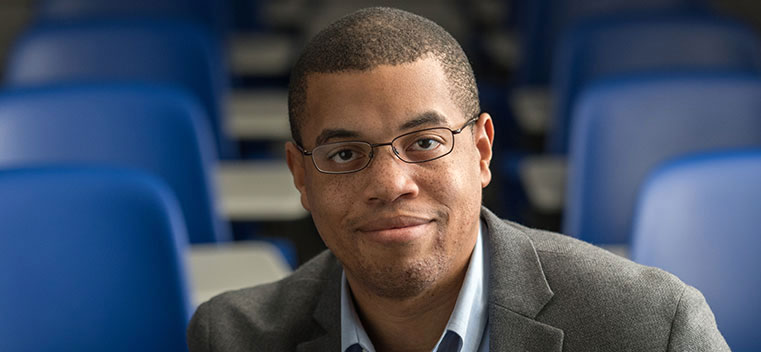
Equitable Education Advocate: Jordan Conwell
What's Up Docs?
Dancing Queen: Dionne Champion
Equitable Education Advocate: Jordan Conwell
Native Voices in Verse: Alanna Hickey
Up on the Roof: Kelly Ksiazek-Mikenas
Pop Culture Detective: Michael Mauskapf
Mixed Messages: Almita Miranda
Stream of Consciousness: Kevin Roche
Riding the Gravitational Waves: Carl Rodriguez
Tell us what you think. E-mail comments or questions to the editors at letters@northwestern.edu.
Find Us on Social Media
Jordan Conwell ’14 MA is an education groupie. Teachers are the rock stars, he says, doing the difficult work in the classroom. An academic researcher, Conwell and his peers “follow the band around and try to help.
“I’m hoping that I do work that helps them do their jobs more effectively.”
His research focuses on how racial and class inequalities intersect to shape students’ access to educational resources and, subsequently, their school outcomes. Conwell’s dissertation looks at racial achievement gaps between students whose parents make comparable incomes, such as the remaining achievement gap between a black student and a white student whose families both have household incomes of $75,000. He seeks to find out why such gaps exist and how the size of the gaps, and the reasons for them, have changed from the 1960s to the present.
“It’s a really important time to be doing this kind of research,” says Conwell. “I think we’re headed toward a debate about whether or not public education — and high-quality public education — is a right for all children or a good that parents purchase, either directly through private schools and tutors and educational resources or indirectly by being able to afford to move into neighborhoods that have high-quality public schools. I hope to add some insight to that conversation.”
Conwell’s interest in educational research stems from his and his family’s school experiences. Conwell grew up in Rocky River, Ohio, where he attended a mix of public and private elementary and middle schools and a Cleveland Catholic high school before graduating from Bates College as a double major in sociology and rhetorical theory and criticism. Conwell, whose parents were both first-generation four-year college students, says he’s always believed in “education as a means of social uplift.
“There are many broader reasons of equity and justice for why we need equitable education,” he says. “At the end of the day I think it’s also just an economic argument, which is that having large numbers of individuals in our population who are underprepared to participate in our society, our economy and our polity, that’s making all of us worse off. That’s making all of us poorer.
“The goal of documenting these problems is to understand how inequality is produced and reproduced across generations and figure out ways to interrupt that.”
In the fall Conwell will join the faculty at the University of Wisconsin–Madison as an assistant professor in the departments of sociology and educational policy studies.



 Facebook
Facebook Twitter
Twitter Email
Email


